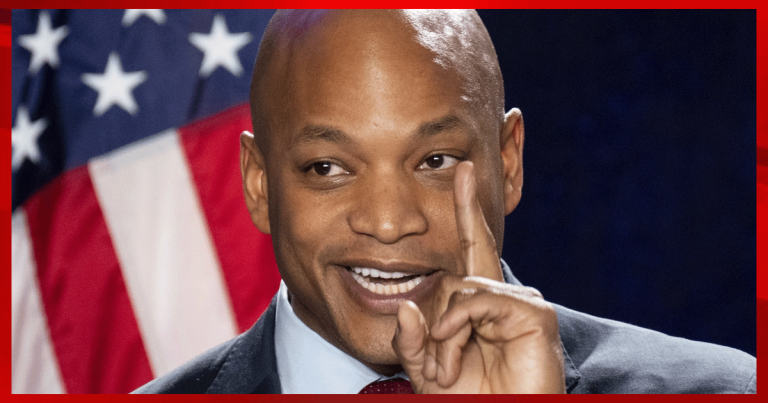
Ever notice how some political fads, especially the really “out there” ones, seem to have a built-in expiration date? They blaze onto the scene, pushed by the usual suspects who declare them the Next Big Thing in societal enlightenment. But then, reality – that stubborn old thing – has a funny way of catching up. Suddenly, the air goes out of the balloon, often when the sheer unworkability or public backlash becomes too loud to ignore.
It’s particularly amusing, isn’t it, when the people who usually champion these high-minded, low-sense ideas are the ones forced to pump the brakes? You almost feel a little sorry for them. Almost. It’s like watching a parade leader suddenly realize the crowd isn’t cheering, they’re actually just trying to get to work, and maybe, just maybe, blocking Main Street for three hours wasn’t the best plan after all.
And wouldn’t you know it, a perfect example of this dawning awareness just landed with a thud, straight out of deep-blue Maryland. The state’s Democratic Governor, Wes Moore – who happens to be the state’s first Black governor and the nation’s only sitting Black governor, mind you – just did something that must have sent shockwaves through the progressive echo chamber. He vetoed a bill to create yet another commission to study reparations.
Finally, Someone Says ‘Enough Studies Already!’
That’s right. Instead of nodding along with the endless call for more “dialogue” and “study” that rarely leads anywhere but to more demands, Governor Moore actually suggested, well, action on things that might genuinely help people. He pointed out that Maryland already has several commissions looking into historical injustices. In his veto letter, he laid out a surprisingly pragmatic approach.
From ‘The Hill’:
“But in light of the many important studies that have taken place on this issue over nearly three decades, now is the time to focus on the work itself: Narrowing the racial wealth gap, expanding homeownership, uplifting entrepreneurs of color, and closing the foundational disparities that lead to inequality — from food insecurity to education.”
Imagine that! Focusing on tangible improvements rather than chasing the phantom of taxpayer-funded payouts for grievances centuries old. Moore essentially said, “We’ve studied this enough; let’s get to work on real solutions.” It’s the kind of common sense that has been sorely lacking, and frankly, it’s refreshing to hear, no matter who’s saying it.
Cue the Outrage from the Grievance Industry
Naturally, not everyone was thrilled with this outbreak of pragmatism. The Legislative Black Caucus of Maryland, which had championed the bill, was quick to condemn the Governor. They lamented that Moore “chose to block this historic legislation,” accusing him of failing to “boldly and courageously recognize our painful history.” They even took a swipe, saying this happened “At a time when the White House and Congress are actively targeting Black communities, dismantling diversity initiatives, and using harmful coded language.”
One can only assume they’re referring to President Trump’s administration finally taking a stand against the divisive, discriminatory DEI (Diversity, Equity, and Inclusion) rackets that have infected so many institutions. Apparently, to these activists, anything short of blank checks and endless “studies” into how to carve up the American pie based on ancestry is a step backward. Governor Moore, it seems, just wasn’t willing to play that particular game this time around.
Is This How the Reparations Grift Crumbles?
While Moore’s veto is a welcome sign, the push for reparations is far from over. States like California are still entertaining ludicrous proposals, like recommending eligible recipients receive up to $1.2 million each. Illinois has also dipped its toes in these murky waters. These schemes aren’t just fiscally insane; they’re profoundly divisive, seeking to assign collective guilt and demand recompense in ways that tear at the fabric of a nation built on individual responsibility and equal opportunity today.
Governor Moore’s decision in Maryland, however, might just be a bellwether. Perhaps even some Democrats are starting to realize that the American people are tired of these endless virtue signals that come with a hefty price tag and achieve little beyond stoking resentment. Maybe, just maybe, focusing on policies that empower all citizens to succeed is starting to sound like a better idea than bankrolling a grievance industry.
It’s a small step, but in the current political climate, any step towards fiscal sanity and away from the cliff of woke absurdity is worth noting. One can only hope other elected officials, regardless of party, take a page from Governor Moore’s playbook and start prioritizing practical solutions over politically charged, unworkable pipe dreams.
Key Takeaways:
- MD’s Dem. Gov. Moore vetoed a reparations study, urging practical action over endless debate.
- Moore’s veto signals growing public and even some Democrat resistance to radical ‘woke’ policies.
- The decision champions fiscal sense and real solutions over divisive, symbolic reparations gestures.
Sources: The Hill


